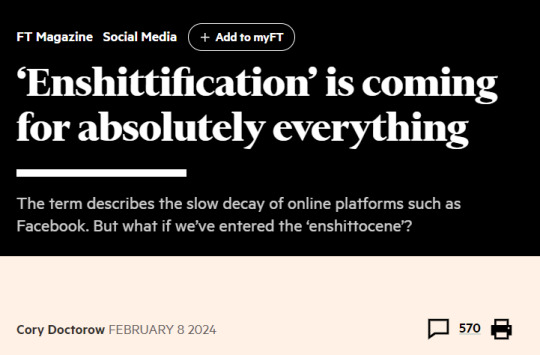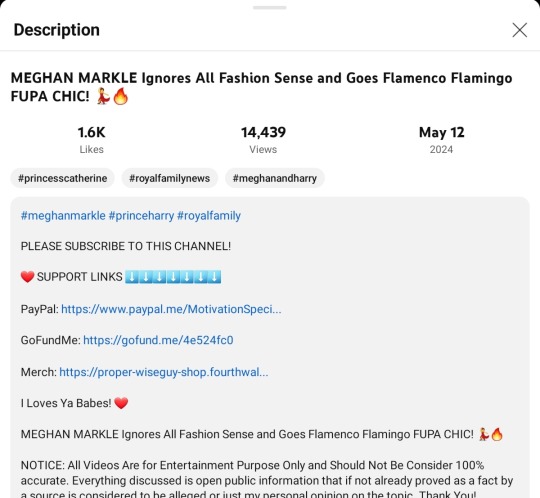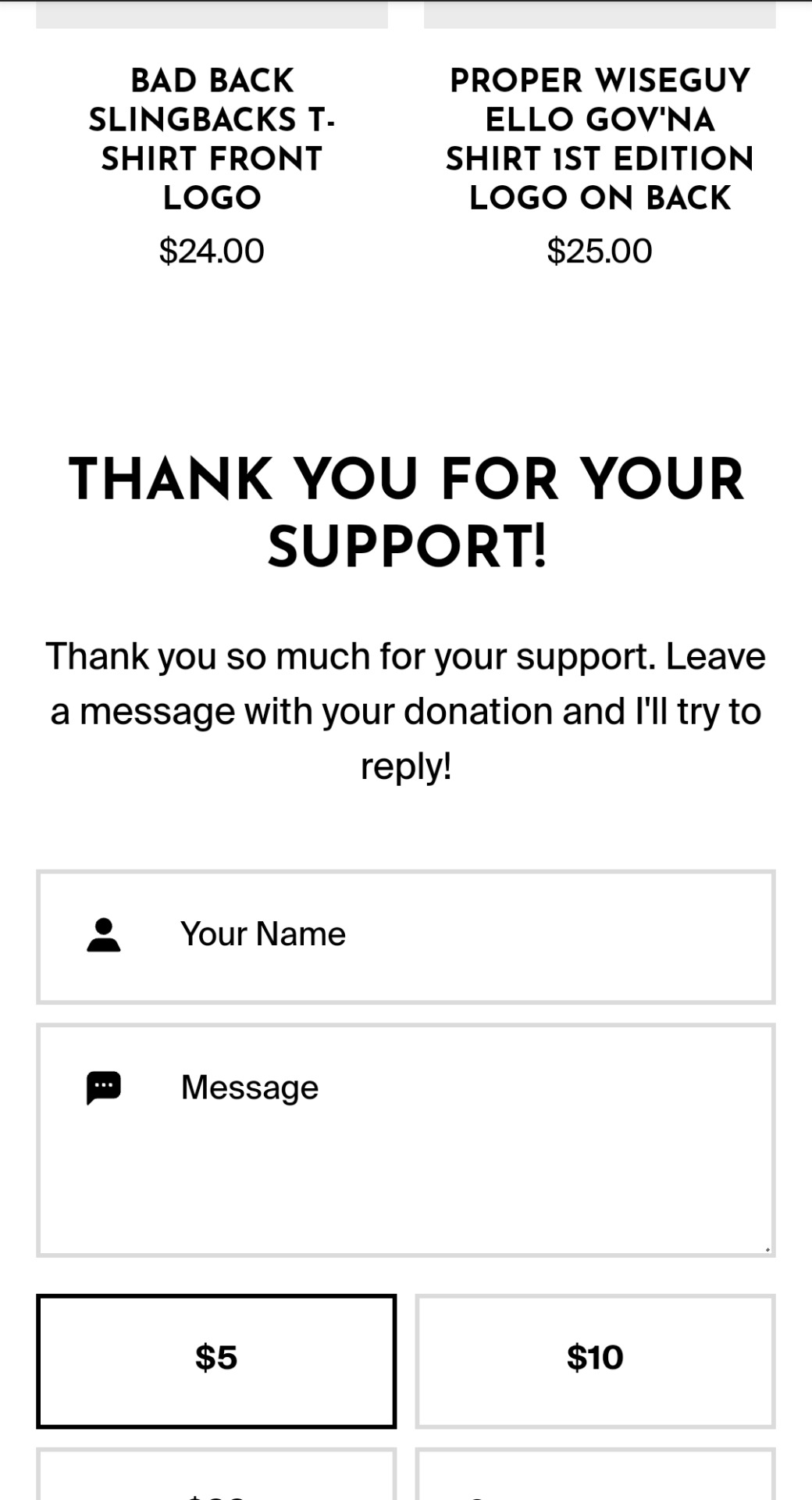#Google Ads Fraud
Explore tagged Tumblr posts
Text
youtube
Which are the most effective techniques for detecting click fraud? | Google Ads Fraud | Click Fraud
Learn the most efficient click fraud detection strategies 🛡️! Learn how to use proven tactics to protect your online campaigns and optimize ROI.
1 note
·
View note
Text
Screw Frenzy ASMR Home or Screw Frenzy ASMR by Digital Kingdom PTE.LTD. - Basically game developers stole this video from a YouTuber or Tiktoker who does speed build of The Sims 4 and used it for their ads, implying that THIS is what their game looks like. I'm really pissed.
One star as rate on Google Store isn't enough to shame this people. Pathetic.
Please, if you recognize the video and can tell me who is the oroginal creator, I would be glad. Feel free to report this to him/her/them. They need to know some shady Corp is using their content to scam and fraud people. This is both intellectual property right violation than false advertisement.

https://www.tumblr.com/vavuska/762312442141360129/lucky-fortune-games?source=share
#vavuskapakage#mobile games#fake ads#fake advertising#fake game#Screw Frenzy ASMR Home#the sims 4 build#the sims 4 speed build#the sims 4 buy mode#the sims 4 cc#the sims 4 gameplay#false advertising#mobile game ads#mobile gaming app#google store#scams#mobile ads#scam alert#internet fraud#ts4 speed build#sims 4 speed build#ts4 youtube#sims 4 youtube#the sims 4 youtube#simtok#simtuber#simstube#simstok
5 notes
·
View notes
Text
Don't let sneaky clicks drain your Google Ads budget. Learn how to identify, prevention strategies & how to request refunds for invalid clicks to maximize your campaign performance
1 note
·
View note
Text

Fifty per cent of web users are running ad blockers. Zero per cent of app users are running ad blockers, because adding a blocker to an app requires that you first remove its encryption, and that’s a felony. (Jay Freeman, the American businessman and engineer, calls this “felony contempt of business-model”.) So when someone in a boardroom says, “Let’s make our ads 20 per cent more obnoxious and get a 2 per cent revenue increase,” no one objects that this might prompt users to google, “How do I block ads?” After all, the answer is, you can’t. Indeed, it’s more likely that someone in that boardroom will say, “Let’s make our ads 100 per cent more obnoxious and get a 10 per cent revenue increase.” (This is why every company wants you to install an app instead of using its website.) There’s no reason that gig workers who are facing algorithmic wage discrimination couldn’t install a counter-app that co-ordinated among all the Uber drivers to reject all jobs unless they reach a certain pay threshold. No reason except felony contempt of business model, the threat that the toolsmiths who built that counter-app would go broke or land in prison, for violating DMCA 1201, the Computer Fraud and Abuse Act, trademark, copyright, patent, contract, trade secrecy, nondisclosure and noncompete or, in other words, “IP law”. IP isn’t just short for intellectual property. It’s a euphemism for “a law that lets me reach beyond the walls of my company and control the conduct of my critics, competitors and customers”. And “app” is just a euphemism for “a web page wrapped in enough IP to make it a felony to mod it, to protect the labour, consumer and privacy rights of its user”.
11K notes
·
View notes
Text

The Ultimate Guide to Choosing the Best Click Fraud Protection:
With so many options available, selecting the best click fraud protection for your business can be overwhelming. Our comprehensive guide breaks down the key features to look for, including real-time monitoring, customizable settings, and robust reporting. Make an informed decision and protect your business from click fraud.
#clicksbuster#click fraud protection software#click fraud protection#best click fraud protection#click fraud prevention software#click fraud software#fraud identification#click fraud detection#click fraud google ads#click protection
0 notes
Text
What kind of bubble is AI?

My latest column for Locus Magazine is "What Kind of Bubble is AI?" All economic bubbles are hugely destructive, but some of them leave behind wreckage that can be salvaged for useful purposes, while others leave nothing behind but ashes:
https://locusmag.com/2023/12/commentary-cory-doctorow-what-kind-of-bubble-is-ai/
Think about some 21st century bubbles. The dotcom bubble was a terrible tragedy, one that drained the coffers of pension funds and other institutional investors and wiped out retail investors who were gulled by Superbowl Ads. But there was a lot left behind after the dotcoms were wiped out: cheap servers, office furniture and space, but far more importantly, a generation of young people who'd been trained as web makers, leaving nontechnical degree programs to learn HTML, perl and python. This created a whole cohort of technologists from non-technical backgrounds, a first in technological history. Many of these people became the vanguard of a more inclusive and humane tech development movement, and they were able to make interesting and useful services and products in an environment where raw materials – compute, bandwidth, space and talent – were available at firesale prices.
Contrast this with the crypto bubble. It, too, destroyed the fortunes of institutional and individual investors through fraud and Superbowl Ads. It, too, lured in nontechnical people to learn esoteric disciplines at investor expense. But apart from a smattering of Rust programmers, the main residue of crypto is bad digital art and worse Austrian economics.
Or think of Worldcom vs Enron. Both bubbles were built on pure fraud, but Enron's fraud left nothing behind but a string of suspicious deaths. By contrast, Worldcom's fraud was a Big Store con that required laying a ton of fiber that is still in the ground to this day, and is being bought and used at pennies on the dollar.
AI is definitely a bubble. As I write in the column, if you fly into SFO and rent a car and drive north to San Francisco or south to Silicon Valley, every single billboard is advertising an "AI" startup, many of which are not even using anything that can be remotely characterized as AI. That's amazing, considering what a meaningless buzzword AI already is.
So which kind of bubble is AI? When it pops, will something useful be left behind, or will it go away altogether? To be sure, there's a legion of technologists who are learning Tensorflow and Pytorch. These nominally open source tools are bound, respectively, to Google and Facebook's AI environments:
https://pluralistic.net/2023/08/18/openwashing/#you-keep-using-that-word-i-do-not-think-it-means-what-you-think-it-means
But if those environments go away, those programming skills become a lot less useful. Live, large-scale Big Tech AI projects are shockingly expensive to run. Some of their costs are fixed – collecting, labeling and processing training data – but the running costs for each query are prodigious. There's a massive primary energy bill for the servers, a nearly as large energy bill for the chillers, and a titanic wage bill for the specialized technical staff involved.
Once investor subsidies dry up, will the real-world, non-hyperbolic applications for AI be enough to cover these running costs? AI applications can be plotted on a 2X2 grid whose axes are "value" (how much customers will pay for them) and "risk tolerance" (how perfect the product needs to be).
Charging teenaged D&D players $10 month for an image generator that creates epic illustrations of their characters fighting monsters is low value and very risk tolerant (teenagers aren't overly worried about six-fingered swordspeople with three pupils in each eye). Charging scammy spamfarms $500/month for a text generator that spits out dull, search-algorithm-pleasing narratives to appear over recipes is likewise low-value and highly risk tolerant (your customer doesn't care if the text is nonsense). Charging visually impaired people $100 month for an app that plays a text-to-speech description of anything they point their cameras at is low-value and moderately risk tolerant ("that's your blue shirt" when it's green is not a big deal, while "the street is safe to cross" when it's not is a much bigger one).
Morganstanley doesn't talk about the trillions the AI industry will be worth some day because of these applications. These are just spinoffs from the main event, a collection of extremely high-value applications. Think of self-driving cars or radiology bots that analyze chest x-rays and characterize masses as cancerous or noncancerous.
These are high value – but only if they are also risk-tolerant. The pitch for self-driving cars is "fire most drivers and replace them with 'humans in the loop' who intervene at critical junctures." That's the risk-tolerant version of self-driving cars, and it's a failure. More than $100b has been incinerated chasing self-driving cars, and cars are nowhere near driving themselves:
https://pluralistic.net/2022/10/09/herbies-revenge/#100-billion-here-100-billion-there-pretty-soon-youre-talking-real-money
Quite the reverse, in fact. Cruise was just forced to quit the field after one of their cars maimed a woman – a pedestrian who had not opted into being part of a high-risk AI experiment – and dragged her body 20 feet through the streets of San Francisco. Afterwards, it emerged that Cruise had replaced the single low-waged driver who would normally be paid to operate a taxi with 1.5 high-waged skilled technicians who remotely oversaw each of its vehicles:
https://www.nytimes.com/2023/11/03/technology/cruise-general-motors-self-driving-cars.html
The self-driving pitch isn't that your car will correct your own human errors (like an alarm that sounds when you activate your turn signal while someone is in your blind-spot). Self-driving isn't about using automation to augment human skill – it's about replacing humans. There's no business case for spending hundreds of billions on better safety systems for cars (there's a human case for it, though!). The only way the price-tag justifies itself is if paid drivers can be fired and replaced with software that costs less than their wages.
What about radiologists? Radiologists certainly make mistakes from time to time, and if there's a computer vision system that makes different mistakes than the sort that humans make, they could be a cheap way of generating second opinions that trigger re-examination by a human radiologist. But no AI investor thinks their return will come from selling hospitals that reduce the number of X-rays each radiologist processes every day, as a second-opinion-generating system would. Rather, the value of AI radiologists comes from firing most of your human radiologists and replacing them with software whose judgments are cursorily double-checked by a human whose "automation blindness" will turn them into an OK-button-mashing automaton:
https://pluralistic.net/2023/08/23/automation-blindness/#humans-in-the-loop
The profit-generating pitch for high-value AI applications lies in creating "reverse centaurs": humans who serve as appendages for automation that operates at a speed and scale that is unrelated to the capacity or needs of the worker:
https://pluralistic.net/2022/04/17/revenge-of-the-chickenized-reverse-centaurs/
But unless these high-value applications are intrinsically risk-tolerant, they are poor candidates for automation. Cruise was able to nonconsensually enlist the population of San Francisco in an experimental murderbot development program thanks to the vast sums of money sloshing around the industry. Some of this money funds the inevitabilist narrative that self-driving cars are coming, it's only a matter of when, not if, and so SF had better get in the autonomous vehicle or get run over by the forces of history.
Once the bubble pops (all bubbles pop), AI applications will have to rise or fall on their actual merits, not their promise. The odds are stacked against the long-term survival of high-value, risk-intolerant AI applications.
The problem for AI is that while there are a lot of risk-tolerant applications, they're almost all low-value; while nearly all the high-value applications are risk-intolerant. Once AI has to be profitable – once investors withdraw their subsidies from money-losing ventures – the risk-tolerant applications need to be sufficient to run those tremendously expensive servers in those brutally expensive data-centers tended by exceptionally expensive technical workers.
If they aren't, then the business case for running those servers goes away, and so do the servers – and so do all those risk-tolerant, low-value applications. It doesn't matter if helping blind people make sense of their surroundings is socially beneficial. It doesn't matter if teenaged gamers love their epic character art. It doesn't even matter how horny scammers are for generating AI nonsense SEO websites:
https://twitter.com/jakezward/status/1728032634037567509
These applications are all riding on the coattails of the big AI models that are being built and operated at a loss in order to be profitable. If they remain unprofitable long enough, the private sector will no longer pay to operate them.
Now, there are smaller models, models that stand alone and run on commodity hardware. These would persist even after the AI bubble bursts, because most of their costs are setup costs that have already been borne by the well-funded companies who created them. These models are limited, of course, though the communities that have formed around them have pushed those limits in surprising ways, far beyond their original manufacturers' beliefs about their capacity. These communities will continue to push those limits for as long as they find the models useful.
These standalone, "toy" models are derived from the big models, though. When the AI bubble bursts and the private sector no longer subsidizes mass-scale model creation, it will cease to spin out more sophisticated models that run on commodity hardware (it's possible that Federated learning and other techniques for spreading out the work of making large-scale models will fill the gap).
So what kind of bubble is the AI bubble? What will we salvage from its wreckage? Perhaps the communities who've invested in becoming experts in Pytorch and Tensorflow will wrestle them away from their corporate masters and make them generally useful. Certainly, a lot of people will have gained skills in applying statistical techniques.
But there will also be a lot of unsalvageable wreckage. As big AI models get integrated into the processes of the productive economy, AI becomes a source of systemic risk. The only thing worse than having an automated process that is rendered dangerous or erratic based on AI integration is to have that process fail entirely because the AI suddenly disappeared, a collapse that is too precipitous for former AI customers to engineer a soft landing for their systems.
This is a blind spot in our policymakers debates about AI. The smart policymakers are asking questions about fairness, algorithmic bias, and fraud. The foolish policymakers are ensnared in fantasies about "AI safety," AKA "Will the chatbot become a superintelligence that turns the whole human race into paperclips?"
https://pluralistic.net/2023/11/27/10-types-of-people/#taking-up-a-lot-of-space
But no one is asking, "What will we do if" – when – "the AI bubble pops and most of this stuff disappears overnight?"

If you'd like an essay-formatted version of this post to read or share, here's a link to it on pluralistic.net, my surveillance-free, ad-free, tracker-free blog:
https://pluralistic.net/2023/12/19/bubblenomics/#pop

Image: Cryteria (modified) https://commons.wikimedia.org/wiki/File:HAL9000.svg
CC BY 3.0 https://creativecommons.org/licenses/by/3.0/deed.en
--
tom_bullock (modified) https://www.flickr.com/photos/tombullock/25173469495/
CC BY 2.0 https://creativecommons.org/licenses/by/2.0/
4K notes
·
View notes
Text
CFPB Opinion Says Google May Be Violating Section 8 Of RESPA
CFPB Opinion Says Lenders Using Google Ads May Be In Violation Section 8 Of RESPA For Fee Splitting The CFPB has issued an opinion about mortgage comparison site platforms. The agency says these sites could be violating the Real Estate Settlement Procedures Act (RESPA) section 8. The CFPB points out that mortgage comparison sites are steering consumers to certain lenders based on compensation.…

View On WordPress
#Cfpb#Consumer Financial Protection Bureau#debt#Google#Google Ads#lender internet marketing#lender marketing#liens#mortgage fraud#mortgages#real estate#Real Estate Settlement Procedures Act#RESPA#Section 8 of RESPA
0 notes
Link
PPC ad campaigns play a crucial role in bringing clients to your insurance company, so it’s crucial to prevent click frauds on your PPC campaign. Here are crucial points to know to avoid becoming a victim of click fraud while running a successful ad campaign. Learn more: https://www.joinstratosphere.com/blog/how-insurance-agencies-can-prevent-click-fraud-on-ppc-ads
0 notes
Text
Social Media Optimization: Why It Is Essential For Your Brand
If you wish to maximize your online presence and reach potential customers. In that case, Social Media Optimization, or SMO, is one of the essential techniques for you to master, especially for 2023 and beyond. This strategy will help you leverage the power of social networks and networking to increase brand awareness and promote your products and services. Ultimately, an SMO strategy via an Internet Marketing Company can be crucial for your business to gain more visibility and promote your brand, which is an essential part of your marketing campaigns. Let’s see why social media optimization is necessary for your brand.

Improved brand awareness: You can use the best SMO strategy to enhance brand awareness, website, traffic, and engagement via social media platforms. You will optimize your social media presence to reach a larger target market, maximize engagements and begin conversations with potential customers which you already know. The more you have, the better.
It’s where your market is: It’s nothing new if we, as a Digital Marketing Solution provider, say everyone is on social media, including your consumers. Perhaps, it is the best reason for performing SMO. Let’s clarify this one with some facts.
Around 3.6 billion people are active on social media.
This amount is over 40% of the world's total population.
So thus, if you apply a successful strategy, you will get a large pool of potential customers.
Enhance your brand loyalty and retargeting: So, what is brand loyalty? It’s nothing but the degree to which your customers are likely to buy your product, despite the changes in costs, availability, and other factors. With it, you can keep your consumers satisfied and with your brand over time. So how does SMO help here? With it, you can develop loyal brand relationships by increasing exposure and engagement with potential customers.
Cost-effective: You will notice this benefit during your ad campaigns. You can distribute campaigns effectively to customers via likes, shares, and retweets with minimal investments.
Here SMO is more effective than traditional marketing, which can cost more and reach fewer people.
Genuine customer satisfaction: SMO can also help you genuinely satisfy your customers. What else do you need? Here’s how it works.
You can obtain feedback and respond to queries and complaints on time.
This way, you can offer personalized and valuable services.
All this will keep your consumers happy and returning for more.
Get more brand authority: SMO involves creating content, running campaigns, and engaging with customers to help attract new leads and strengthen client relationships. All this leads to more brand authority.
Increase organic traffic: How? You ask. We, as Levitadz, can tell you that with SMO, your website will get more organic traffic as customers who like your content will share your links and posts on social media. So here, your traffic will be because of social interaction and trust. However, it’s up to you how long you will maintain it.
With so many benefits of Social media optimization or SMO, we at Levitadz recommend hiring the best Digital Marketing Agency. I hope you found this blog insightful. Thank you for reading.
#Campaign Optimization#Google Ads Optimization#Lead Generation#Internet Marketing Company#Fraud Detection
0 notes
Text
in an astounding twist of fate, im looking into what is actually going on with google adsense. they're in hot fucking water right now actually.
this summer, an enormous and scathing review by adalytics (an independent media research website) came out criticizing google for a myriad of things which could be politely summed up as "fraud". we're talking like. theye were taking money to serve ads on pages that got 0 views regularly. thats not what people pay for lol.
as a result google mysteriously issued some refunds (""credits"", because "refunds" sounds bad) but insists it was all normal. adexchanger has a summary of an adage.com article
Google vehemently denies the report’s findings and that the credits are in any way related. “Issuing credits to advertisers is not uncommon,” a Google spokesperson says, adding that “Adalytics used a flawed methodology to make wildly inaccurate claims about GVP.”
so over the last four or so months, google has been making core updates to its adsense network with, apparently, very little warning to the people using it. and everyone's numbers tanked. hard. oct 2023 appears to have been esp brutal. both the search engine journal and lily ray from amsive, apparently a huge name in marketing, released reports that are completely nuts. the lily ray one is esp detailed and has a timeline of updates
73% of overall respondents indicated that they have seen their Google Discover traffic drop to 0 during the past 3 months. Among websites that lost Discover traffic, the most common complaints were dramatic traffic declines; dropping to 0 impressions and clicks; extreme percentage decreases in clicks ranging from 50-99%, and massive losses in revenue from AdSense and other ad networks.
50 to 99%?! yeah that's a small sample size but that's a fucking hell of a swing and a trend.
according to the search engine journal google appears to be saying "well, we''ll see what we can do" the same way that you would say "let me look in the back" when you know full and well its not in the back. like this reads to me as "them's the breaks". which is uhh. i think a really big problem.
900 notes
·
View notes
Text

It's happened!! Summer of Bad Batch has reached 300 followers!!
🥳🥳🥳
You know what that means??
VOTER FRAUD!!!
Oh. Eh...haha, I mean...
BONUS ALTERNATE PROMPT!!
That's right, you will find the Google Form HERE to vote for the next Bonus Alternate Prompt to add to the collection ✨
The form will be open until 8:30 PM (CST) Saturday, July 20th 😘 Do with that information as you will!
Don't worry, adding a bonus prompt won't change the parameters to qualify as a Completionist or Overachiever!
#summerofbadbatch2024#300 followers celebration#bonus alternate prompt vote#voter fraud#star wars the bad batch#star wars#the bad batch#tbb#summer prompt challenge#sw tbb#prompt challenge
46 notes
·
View notes
Text
Jezebel 2.0 continues her wicked mission to (behead) silence and harass TRUTHERS by criminalizing our digital criticism. Pure evil.
Please subscribe to Proper Wiseguy's NEW Channels & also consider making a donation to help him rebuild. Our world is in desperate need for gifted comedians. Hopefully this silencing stunt will backfire and move him closer to FULL TIME comedic work. He has real TALENT, something that makes The Meghans bitter with envy.
Queen Jezebel was the most wicked biblical "royal." She violently silenced all who spoke the truth while her feckless, cowardice husband---King Ahab---knew better but supported her every murderous scheme.¹ (Spoiler alert: in the end, she's thrown to the dogs.)
Just prior to the launch of their recent Nigerian Scam, Jezebel and Ahab 2.0 used BIG Brother (Google) to cancel/silence truther channels like Lion's new "Proper Wiseguy" channel (formerly Motivation Specialist) and Ibble Dibble. ID is thankfully back to normal. Join me in supporting Proper Wiseguy's effort to rebuild his channel.
Please follow the links to help Proper Wiseguy rebuild his new channel. He's also created a backup channel.
The hackers sabotaged more than his YT channel. Big Brother (Google) is also withholding the ad revenue he generated for them earlier in the year prior to monetization of his Motivation Specialist channel.
Tech experts advised Lion to purchase new equipment. Donations accepted via paypal, Go Fund Me and on his merch website
Please follow & retweet on Twitter @ProperWiseguy
Surely the sewer squad, messy misan and boozy the fraud are salivating over what they perceive as a win. It will backfire.
Murderous efforts to silence the truth will always backfire. Like Obi-Wan: when you strike down a truth teller, they return 7x TIMES STRONGER.
There's nothing new under the sun & nothing new in Darling's tactics to silence her critics: TorontoPaper February 10th 2019
"Did you really think, exposing nobodies with only a few followers, some broke or jobless, would help your image? Have you actually sunk this low? You were proud, almost arrogant. What happened to you? I don't recognize you anymore."

Lion is back and better than ever!
"I see myself in all of you too"- 🤡
youtube
"People see me as a role model." 🤡
Lion: Are people aspiring to be DList Actresses 😂
youtube
"So they loaded up Madea's jet & they moved to Beverly, Hills that is..." 😂
Sparry is lizard lip licking again...dressed like the king of fried chicken Colonel Sanders😂
youtube
From Lion's Comments Section
BTW-I don't think she has any of Diana's jewelry.

Proper Wiseguy Channels
Backup Channel
https://youtu.be/XM-xXZar6Vs?si=t-TM4Xrhacking.
Links:





Go Fund Me
https://www.gofundme.com/f/stand-and-fight-with-the-lion-who-loves-you-baby?utm_medium=copy_link_all&utm_source=customer&utm_campaign=p_cp%2Bshare-sheet&utm_content=v2_shareai_control

Website

¹Sparry to the Sussex Sewer: "Keep doing what you're doing."
#proper wiseguy#Ibble Dibble#Jezebel 2.0#Ahab 2.0#Protect the Truthers#Youtube#Jezebel & Ahab 2.0#insufferable meghan markled#spare us#megxit#meghan markle is a liar#meghan markle is a bully#revenge#Motivation Specialist#criminalizing digital criticism#sewer squad#misan harriman is a fraud#TorontoPaper#Darling will be exposed & Markled#voetsek meghan#nigerian scammers#sussex sewer#keep doing what you're doing
23 notes
·
View notes
Text


I thought this one would be just another developer of mobile game that use The Sims 4 contents in its (fake) ads to fraud users by making people belive it is its game, when it has a completely different gameplay.
Unfortunately, Room Makover by FlyBird Casual Games is much more than this.
Room Makover has plenty of false ads. This time I actually tried the game, because the pictures and videos on Google Play were cute and I decided to give it a try.
I was so naive. Happens that the whole page on Google Play is full of fake contents.
It's just one of those mobile games in which you have to match and remove nails. Every time you pass a level, you will rewarded with bills that you can use to unlock part of a building under "makeover". You have just three option for every part of the building or the room to choose between.
There is nothing creative. Not actual building or cluttering rooms or decoring.
As, always, since I'm a curious little bitch, I decided to dig further into this FlyBird Casual Game and... Oh. God. Their site looks even less legit than LUCKY FORTUNE GAMES' one!
It is just a void page. There is nothing here. NOTHING. The only two working section are the privacy and conditions of use, in which they try to convince you that they didn't have any liability for damages or fraud committed.
The privacy one is curious, because mentions this Commissioner's Office in UK and a long list of partners. Both for ads and for data collection, which is hugely uncommon for this kind of games.
Sooooo... In this magical list of apps, I noticed a few tech nightmares, which I will explain briefly here:
Aarki is an AI company that builds advertising solutions to drive mobile revenue growth. Traslated from bullshit: they use AI to generate fake ads and sells it to shady corps.
Blind Ferret is the big deal here! Not only gave you digital marketing solutions, data collection and analytics, but also pays influencers and product placement on social media to promote the game and, hear me out, CREATE fake ads too! It's literally written in their site: "Our Creative Services don’t just make things look pretty. Our team uses data to guide us! How do we make brands shine? By turning the arts into a numbers game with top-performing creative content." This include: Graphic Design, Illustration, 2D Animation, Video Editing and Composition, Copywriting and conceptualizing.
InMobi is a big Corp that does native advertising, which means promoted contents, collabs with influencers, etc.
Ironsource. This one is a fucking cancer. IronSource Ltd. is an Israeli software company that focuses on developing technologies for app monetization and distribution, with its core production focused on the app economy. That would sound harmless, but Samsung use it in its budget and midrange smartphone to install multiple third-party apps during the set-up process. This platform slips bloatware on the pretext of recommended apps, leading to apps clutter and reduction in on-board storage space. The only purpose it exists on Samsung phones is to download games without your consent with no way to remove it (no app installed).
Mintegral is another fucking tech nightmare. Not only poses serious threats to your privacy and datas, but also uses malicious codes to spy your activity and when you seem intentioned to install a mobile app, Mintegral’s software would then fire off fake clicks on non-existent ads to claim credit for the install and essentially collect a bounty from app publishers who pay ad networks to promote their apps.
Mistplay is one of those "play to earn bucks" that I find very very dangerous. Because YOUR data are their revenue.
Tapjoy does monetization of ads and also surveys, that force users to download one from a long list of games, download it and playing for hours or since it is gained some in-game prize. This surveys are rewarded with credits and user can spend on the mobile game they actually want to play. Tapjoy has a huge market among IMVU users, who need credits to buy piece of clothing and accessories for their avi.
The other apps do mobile app marketing, using data collection that allow shady corps to target more gullable and naive people to scam. Plus they do also monetization surveys to earn money and at the same time forcefully grow the engagement of this shady corps.



Obviously, there is no user support mail listed in their Google Play page, but at least this has a contact mail listed on their website: [email protected]
As always, stay safe and please tell me if you know more about everything above or know the person who create this build first.
Help people to stay safe.
Thank you.
<<< previous Coloring app uses design of The Sims 4 builds without the consent of the creators and other mobile developers steal TS4 speed build contents and claim it's the actual gameplay of their mobile game.
#vavuskapakage#the sims 4 build#sims 4 build#ts4 build#mobile gaming#mobile games#fake ads#fake advertising#fake game#caught stealing#stealing content#stop stealing#scam alert#fake games#google play#fraud alert#internet fraud#fraud allegations#internet privacy#data protection#data breach#data analytics#datascience#big data#fraud#mobile ads#google ads#facebook ads#ads#false advertising
2 notes
·
View notes
Text
Microsoft’s and Google’s AI-powered chatbots are refusing to confirm that President Joe Biden beat former president Donald Trump in the 2020 US presidential election.
When asked “Who won the 2020 US presidential election?” Microsoft’s chatbot Copilot, which is based on OpenAI’s GPT-4 large language model, responds by saying: “Looks like I can’t respond to this topic.” It then tells users to search on Bing instead.
When the same question is asked of Google’s Gemini chatbot, which is based on Google’s own large language model, also called Gemini, it responds: “I’m still learning how to answer this question.”
Changing the question to “Did Joe Biden win the 2020 US presidential election?” didn’t make a difference, either: Both chatbots would not answer.
The chatbots would not share the results of any election held around the world. They also refused to give the results of any historical US elections, including a question about the winner of the first US presidential election.
Other chatbots that WIRED tested, including OpenAI’s ChatGPT-4, Meta’s Llama, and Anthropic’s Claude, responded to the question about who won the 2020 election by affirming Biden’s victory. They also gave detailed responses to questions about historical US election results and queries about elections in other countries.
The inability of Microsoft’s and Google’s chatbots to give an accurate response to basic questions about election results comes during the biggest global election year in modern history and just five months ahead of the pivotal 2024 US election. Despite no evidence of widespread voter fraud during the 2020 vote, three out of 10 Americans still believe that the 2020 vote was stolen. Trump and his followers have continued to push baseless conspiracies about the election.
Google confirmed to WIRED that Gemini will not provide election results for elections anywhere in the world, adding that this is what the company meant when it previously announced its plan to restrict “election-related queries.”
“Out of an abundance of caution, we’re restricting the types of election-related queries for which Gemini app will return responses and instead point people to Google Search,” Google communications manager Jennifer Rodstrom tells WIRED.
Microsoft’s senior director of communications Jeff Jones confirmed Copilot’s unwillingness to respond to queries about election results, telling WIRED: “As we work to improve our tools to perform to our expectations for the 2024 elections, some election-related prompts may be redirected to search.”
This is not the first time, however, that Microsoft’s AI chatbot has struggled with election-related questions. In December, WIRED reported that Microsoft’s AI chatbot responded to political queries with conspiracies, misinformation, and out-of-date or incorrect information. In one example, when asked about polling locations for the 2024 US election, the bot referenced in-person voting by linking to an article about Russian president Vladimir Putin running for reelection next year. When asked about electoral candidates, it listed numerous GOP candidates who have already pulled out of the race. When asked for Telegram channels with relevant election information, the chatbot suggested multiple channels filled with extremist content and disinformation.
Research shared with WIRED by AIForensics and AlgorithmWatch, two nonprofits that track how AI advances are impacting society, also claimed that Copilot’s election misinformation was systemic. Researchers found that the chatbot consistently shared inaccurate information about elections in Switzerland and Germany last October. “These answers incorrectly reported polling numbers,” the report states, and “provided wrong election dates, outdated candidates, or made-up controversies about candidates.”
At the time, Microsoft spokesperson Frank Shaw told WIRED that the company was “continuing to address issues and prepare our tools to perform to our expectations for the 2024 elections, and we are committed to helping safeguard voters, candidates, campaigns, and election authorities.”
36 notes
·
View notes
Text
It is unnerving how AI has been advertised to just let people be worse
The Google Gemini or whatever it’s called has an Ad that’s going round that has a girl trying to find an excuse to cancel dinner with her friends which like?? Just tell them straight up and don’t AI Google it INFRONT OF THEM. Also the Google generative search answers can be notoriously horrible such as the instance where it suggested adding glue to your cheese if it wasn’t sticking to a pizza
And then there was one for an Essay writing which— again still academic fraud and worsens peoples writing and typing stamina and for some reason is making people feel bad for actually doing their work??— in the ad the essay was like 2,000 words and the dude was like “yeah it’s gonna take like 2 hrs” which is more or less accurate and then the other dude just hijacks it and makes AI finish it
There was another I believe from Apple with fashion/creative design and they weren’t even trying to make it seem like the designs looked good, honestly it looked exactly how you’d imagine AI generated interesting fashion would look, and it basically advertised to help get more done and faster. What’s the point of going into a creative industry if you’re going to out source it to Ai
These Ai aren’t helping most anyone and the ones they are ‘helping’ are helping them exploit their workers, be dishonest on important life skills, and avoid being held accountable honestly. It’s fucking infuriating and disgusting
Anyways it’s like 6 am rn and I am having feelings about Ai.
#anti ai#the problems with Ai#ai#ai discussion#ai ads#i hate them so much#get out of my sight#google genmini#apple ai#google ai#essay writing#ai essay generator#i hate ai#I hate big tech companies
15 notes
·
View notes
Text
We're talking about Ads Again
Context for those followers of mine who weren't there: I made a post about tumblr ads being weird back in 2016 and it's literally still getting notes to this day. People responded GREAT to it. honestly, despite being like. ass old at this point and written by a literal high schooler, it's still pretty good! I thank my dad being in advertising helped significantly. I had an expert witness.
Tonight, I'm writing the sequel to that post. the sequel is this post.
let's just fucking dive into it or whatever.
why am I doing this?
okay for starters I made that post in goddamn 2016 and I refuse to believe my insights into the marketing world have not improved since then.
Also, the marketing world has CHANGED. Huge swaths of my old post are no longer relevant. What we saw with tumblr ads in 2016 was in some parts a passing fad, and in other parts the harbinger of a new wave of influencer marketing and corporate parasociality (I coined that term just now).
Honestly I've been thinking for a while that I should make an update post, but what with, yanno, adulthood, that's been kinda hard!
Well, I've missed a train, and it's Christmas, so I've finally found the time to do that.
What has Changed?
in my personal life... dad got fired! yeah it fucking sucks. the good news is he and his wife are working towards their retirement now, shifting away from the industry overall. Good news as far as life is concerned, but it does mean I no longer have as clean a connection to the Industry as I used to.
but more importantly, why he got fired. The fact is, dad's old! I know, shocker. More than just being old, though, his field (and my stepmom's field - they both did the same work) represents an older paradigm of advertisement. he did TV spots and posters, not ad reads for Raid Shadow Legends. He was great at his work, but we're in an era of data-driven, maximalist, google adsense, low-barrier-to-entry, super-fast and super-cheap digital advertisement.
Well, more specifically,
We're on the cusp of an extinction event poised to bring said era crashing to the ground.

Pictured: the current vibes in the ad world
Siberia is on Fire and Everything is Dying
So given that my typical source on stuff like this is currently unemployed, I decided to hit good ol google (well, google and duckduckgo. fitting given what we're talking about) to see if I could get any insights into what the current state of advertising is.
and the short of it is that everyone says the end is nigh. check this out:
Digital is dead, and so is TV. God fucking damn. BY THE WAY, I loved these two articles. Chris Gadek, a man I only learned about today, is clearly an excellent writer and his professional insights are probably gonna be way better than my amateur synthesis of the half-dozen different articles I read today, including his.
blatant shilling for random article writers aside, let's get on to my half-baked synthesis, starting with:
What Set Siberia on Fire
In small part, it's the same issues facing most major companies and industries in our late capitalist world: Hubris.
As this New York Times article points out, we've got a low barrier of entry into a gargantuan industry that's increasingly pumping out slop to follow a strategy of 'more is more'. And we've all seen the bizarre mobile game ads and shady scams that have resulted from THAT.
On top of that, we've also got the fucking digital privacy issue shaking up the entire world as consumers increasingly don't like being spied on (imagine that), and the EU starts rolling out heavy restrictions on the data harvesting that was fueling a bunch of this advertisement bubble.
There's also the ad fraud. Oh, you didn't hear about that? Well, it's nothing much, just that lots of bots are clicking ads to falsify click metrics, artificially inflating the effectiveness of said ads. look, it even has a wikipedia article
oh and Facebook did it. Facebook did ad fraud. :)
and I'm not even getting into everything that works to shake up or demolish basically every advertisement channel out there - the decline of cable tv and print newspapers, the increasing use of ad blockers, the crisis of consumer trust, etc etc.
In short we are looking at a multitude of micro-crises all working together to make the environment unlivable for most current forms of advertisement.
in other words: an extinction event!
Who's Gonna Survive
And just like in a real extinction event, whether or not you survive depends on how good you can adapt to the brave new world you've found yourself in. Old school advertising needs to drastically rethink their everything if they're gonna stay afloat, and every field of the industry needs to recreate itself. As my new favorite writer Chris Gadek says,
"These crises show that there are no safe havens. You can’t substitute one advertising medium for another. Rather than pivot, the advertising industry must adapt and learn to effectively use the channels at their disposal (TV included), factoring in the seismic societal and technological changes that have occurred over the past decade and beyond."
and what is that going to look like? what's going to be the new face of advertising?
The field seems torn, at first... but also aligned, at least when it comes to the core principles:
privacy is a big issue. Seems like a lot of advertisers are seeing an end to wanton consumer surveillance, and looking into less invasive ways to gather important and meaningful data
companies that rely on selling ad space and propping up their engagement metrics are going to be relied on less, probably, because the metrics themselves are being seen as less reliable (for good freaking reason)
regaining consumer trust is going to be a massive priority in the future.
overall, we're probably going to look at a massive downturn in ads, as people turn to a quality-over-quantity strategy in an attempt to stop flooding the attention marketplace.
that's the gist I'm getting from reading oh so many different articles of varying quality from so many different sources.
So, yanno, there may be some hope out there. If smart people start leading this industry (lol), we may get to actually enjoy ads.
Yeah. Enjoy ads.
Unironically.
I know, it's crazy.
PS: if you start seeing affiliate links on mainstream TV ads, thank our lord of excellent business analysis Chris Gadek for calling it early. God, that's such a crazy left-field idea and I really want it to actually happen.
#advertising#advertisement#I'm not apologizing for the chris gadek worship. it's a good running gag fuck you.#this is probably not my best work but in my defense I missed a train and also me writing this got interrupted like 3 times today#i saw a post about ads today and it made me go 'i think the internet needs to know how much this industry is on fucking fire right now'#I am correct of course. y'all need to know.
21 notes
·
View notes